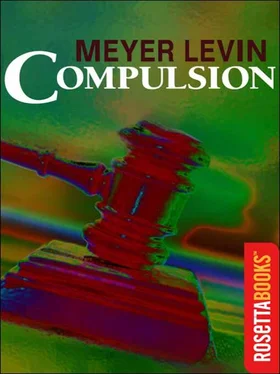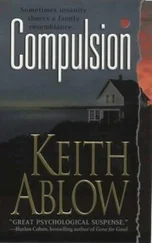“This would surely expiate placing Paulie Kessler in the culvert after he was dead. This would doubtless bring immense satisfaction to some people. It would bring a greater satisfaction because it would be done in the name of justice.
“We hear glib talk of justice. Well, it would make me smile if it did not make me sad. Who knows what it is? Does Mr. Padua know? Does Mr. Horn know? Do I know? Does Your Honour know? Is there a human machinery for finding out? Is there any man who can weigh me and say what I deserve? Can Your Honour? Let us be honest.
“If there is such a thing as justice, it could only be administered by one who knew the inmost thoughts of the men to whom he was meting it out. It means that you must appraise every influence that moves them, the civilization in which they live, and all the society which enters into the making of the child or the man! If Your Honour can do it, you are wise, and with wisdom goes mercy.”
Judd smiled at the gracefulness of it.
“It is not so much mercy either, Your Honour. I can hardly understand myself pleading to a court to visit mercy on two boys by shutting them up in prison for life. Any cry for more roots back to the beasts of the jungle. It is not a part of man. It is not a part of that feeling of mercy and pity and understanding of each other which we believe has been slowly raising man from his low estate.”
He resumed the tale of the crime. “They parked the bloody automobile in front of Judd’s house. They cleaned it to some extent that night and left it standing in the street. ‘Oriented’, of course, ‘oriented’. They left it there for the night so that anybody might see and know. And then in a day or so we find Artie with his pockets stuffed with newspapers telling of the Kessler tragedy. We find him consulting with his friends, with the newspaper reporters; and my experience has been that the last person that a conscious criminal associates with is a reporter.” Wilk looked at us with an appeasing smile. “But he picks up a reporter, and he tells him he has read a great many detective stories, and he knows just how this would happen.
“Talk about scheming! But they must be hanged, because everybody is talking about the case and because their people have money.”
He turned then to a professional tone. He spoke of the traditional arrangements between prosecution and defence, the usual consideration accorded a plea of guilty. “How many times has Your Honour listened to the State’s Attorney come into this court with a man charged with robbery with a gun – which means from ten years to life – and on condition of a plea of guilty ask to have the gun charge stricken out and get him a chance to see daylight inside of three years? How many times?
“What about this matter of crime and punishment, anyhow? You can trace it all down through the history of man. You can trace the burnings, the boilings, the drawings and quarterings, the hanging of people in England at the crossroads, carving them up and hanging them as examples for all to see.
“We can come down to the last century where nearly two hundred crimes were punishable by death. You can read the stories of hanging on a high hill, and the populace for miles around coming out to the scene, that everybody might be awed into goodness. Hanging for picking pockets – and more pockets were picked in the crowd that went to the hanging than had been known before.
“What happened? Gradually the laws have been changed and modified, and men look back with horror at the hangings and killings of the past. What did they find in England? That, as they got rid of these barbarous statutes, crimes decreased instead of increased. I will undertake to say, Your Honour, that you can scarcely find a single scholarly book – and I will include all the works on criminology of the past – that has not made the statement over and over again that as the penal code was made less terrible, crimes grew less frequent.
“This weird tragedy occurred on the twenty-first of May. It has been heralded, broadcast through the world. How many attempted kidnappings have come since then? How many threatening letters have been sent out by weak-minded boys and weak-minded men since then? How many times have they sought to repeat again and again this same crime because of the effect of publicity upon the mind? I can point to examples of killing and hanging in the city of Chicago which have been repeated in detail over and over again, simply from the publicity of the newspapers and the public generally.
“Let us take this case. If these two boys die on the scaffold, which I can never bring myself to imagine, every newspaper in the United States will be filled with the gruesome details. It will enter every home and every family. How many men would enjoy the details? And you cannot enjoy human suffering without being affected for better or for worse; those who enjoyed it would be affected for the worse.
“Do I need to argue to Your Honour that cruelty only breeds cruelty? If there is any way to kill evil and hatred and all that goes with it, it is not through evil and hatred and cruelty; it is through charity and love and understanding.
“There is not a man who is pointed to as an example to the world who has not taught it. There is not a philosopher, there is not a religious leader, there is not a creed that has not taught it.”
We looked to Judd. Would he let himself be defended by this assault on his Nietzschean creed? But he was attentive, only flushing slightly.
“This is a Christian community,” Wilk went on, “so-called; at least it boasts of it. Let me ask this court, is there any doubt about whether these boys would be safe in the hands of the Founder of the Christian religion? It would be blasphemy to say they would not. And yet there are men who want to hang them for a childish, purposeless act, conceived without the slightest malice in the world.
“Your Honour, I have become obsessed with this deep feeling of hate and anger that has swept across the land. I have been fighting it, battling with it until it has fairly driven me mad, until I wonder whether every righteous human emotion has not gone down in a raging storm.
“I am not pleading so much for these boys as I am for the infinite number of others to follow, those who perhaps cannot be as well defended as these have been. It is of them that I am thinking, and for them I am begging of this court not to turn backward toward the barbarous and cruel past.”
In the morning Wilk turned to speak of the boys themselves. “Now, Your Honour, who are these two boys? Straus, a boy robbed of his boyhood, turned into a prodigy; Steiner, with a wonderfully brilliant mind-”
Judd leaned forward, as if at last the moment of fruition had come, when a great soul would interpret him to the world. But it was to the general psychiatric argument that Wilk gave attention. The brilliant youths, from earliest childhood “crowded like hothouse plants to learn more and more and more. But it takes something besides brains to make a human being who can adjust himself to life.
“In fact, as Dr. Ball and Dr. Tierney regretfully admitted, brains are not the chief essential in human conduct. The emotions are the urge that makes us live – the urge that makes us work and play, or move along the pathways of life. They are the instinctive things.”
Wilk pictured the examination by the State’s alienists after the boys had made their confession. “Dr. Tierney and Dr. Ball are undoubtedly able men. Dr. Tierney said this: The only unnatural thing he noted was that they showed no emotional reactions. Dr. Ball said the same. These are the State’s alienists, not ours. These boys could tell this gruesome story without a change of countenance, without the slightest feelings. What was the reason? I do not know. I know what causes the emotional life. I know it comes from the nerves, the endocrine glands, the vegetative system. I know it is practically left out of some. They cannot feel the moral shocks which safeguard others. Is Artie Straus to blame that his machine is imperfect? I have never in my life been interested so much in fixing blame as I have in relieving people from blame. I am not wise enough to fix it.
Читать дальше












